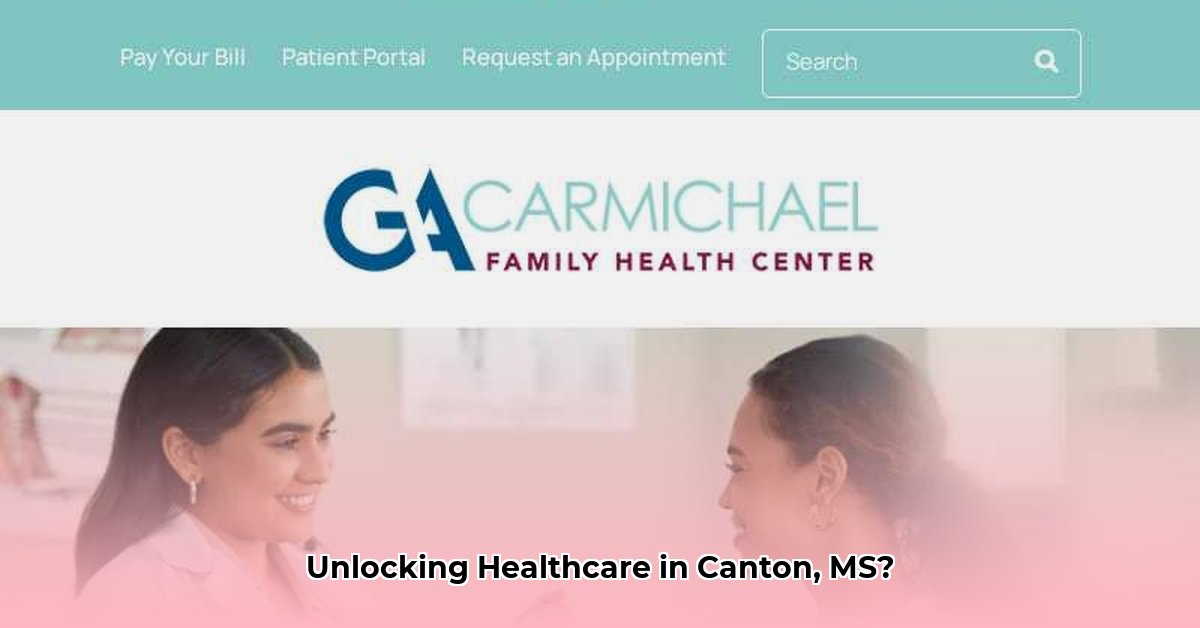
Expanding Healthcare Reach in Canton, Mississippi
The G.A. Carmichael Family Health Center (GACFHC) in Canton, Mississippi, plays a crucial role in ensuring healthcare access for underserved communities in central Mississippi. Its mission is to provide comprehensive primary and specialized healthcare services, acting as a vital component of the region's healthcare infrastructure. Significant funding from the Health Resources and Services Administration (HRSA) allows GACFHC to expand its reach and impact. The Canton clinic serves as a key hub within this network. For similar initiatives, see Brightview Canton.
Services Offered and Community Engagement
GACFHC operates a network of clinics across the region, with the Canton location serving as a central point. While precise details on the full range of services offered at each clinic are currently unavailable, the Canton clinic demonstrably prioritizes community engagement. One notable example is its bilingual (English/Spanish) services, reflecting a commitment to inclusivity and accessibility for a diverse patient population. The center also operates school-based health centers (SBHCs), bringing healthcare directly to students and addressing health-related barriers to education. This proactive approach underscores GACFHC's commitment to holistic community well-being. However, comprehensive data on the complete spectrum of services across all locations is needed for a more thorough analysis.
Operational Analysis: Challenges and Opportunities
GACFHC faces several operational challenges hindering its ability to provide optimal care. A significant impediment is a lack of comprehensive data, preventing effective resource allocation, care coordination, and informed decision-making. This data deficit limits the center's ability to accurately assess its own performance, identify areas for improvement, and justify requests for additional funding.
Key Operational Challenges:
- Resource Allocation: The absence of detailed data makes it difficult to efficiently allocate resources across the various clinics within the network. This necessitates a strategic approach for equitable resource distribution.
- Care Coordination: Improving the flow of care between different GACFHC clinics is crucial. A more effective system for coordinating patient care across multiple locations would enhance patient experience and outcomes.
- Data Deficiencies: Insufficient data collection across all aspects of operations prevents a clear understanding of the center's efficiency, effectiveness, and areas requiring improvement. This lack of data fundamentally restricts informed decision-making.
Opportunities for Improvement:
- Expansion: Strategic expansion of the network could significantly enhance healthcare access in underserved areas. This requires meticulous planning and consideration of community needs.
- Technology Upgrades: Investing in modern healthcare information technology, such as electronic health records (EHRs), would streamline operations, improve data collection, and enable data-driven decision-making.
- Improved Communication: Enhanced communication channels between clinics, staff, and patients are crucial for improving care coordination, efficiency, and patient satisfaction. This necessitates a review of current communication methods and identification of areas for upgrade.
Actionable Strategies: A Collaborative Approach
Addressing the challenges faced by GACFHC requires a collaborative effort involving all stakeholders. The following strategies outline short-term and long-term goals for each group:
Roadmap to Success:
| Stakeholder | Short-Term Goals (0-1 Year) | Long-Term Goals (3-5 Years) |
|---|---|---|
| Administration | Implement a standardized data collection and reporting system. | Develop a comprehensive, long-term plan for growth and expansion, including new services. |
| Clinical Staff | Focus on standardized training and improving communication between clinics. | Develop more specialized training programs focusing on local community health needs. |
| Patients | Make information easier to access and reduce wait times through appointment systems. | Expand services, improve the overall patient experience, and ensure continuity of care. |
| Funding Organizations | Clearly demonstrate how funds are being used effectively; actively seek additional funding. | Secure additional funding for expansion, technology upgrades, and staff development. |
Risk Assessment and Mitigation
GACFHC faces several potential risks that could significantly impact its operational effectiveness and ability to provide care. Proactive risk management is crucial for minimizing these risks and ensuring the center's long-term sustainability:
Potential Risks and Mitigation Strategies:
| Risk | Likelihood | Impact | Mitigation Strategy |
|---|---|---|---|
| Staffing Shortages | Moderate | High | Develop robust recruitment and retention strategies, including competitive compensation and benefits. |
| Technology Gaps | High | Moderate | Invest in a modern EHR system and provide comprehensive staff training on its use. |
| Compliance Issues | Low | High | Conduct regular compliance audits and provide staff with ongoing training on HIPAA, CLIA, and other relevant regulations. |
| Communication Issues | Moderate | Moderate | Implement a unified communication system (e.g., a patient portal and internal communication platform) |
| Medical Errors Liability | Low | High | Implement a robust quality assurance and risk management program. |
Regulatory Implications and Compliance
GACFHC’s HRSA funding necessitates strict adherence to various regulations, including HIPAA (Health Insurance Portability and Accountability Act) for patient privacy and CLIA (Clinical Laboratory Improvement Amendments) for laboratory testing. Maintaining compliance is not only vital for legal reasons but also crucial for maintaining the public trust and ensuring the ethical delivery of healthcare services. The Public Health Service designation provides some legal protection, but sustained diligence in maintaining compliance is essential.
Conclusion: A Path to Sustainable Growth
GACFHC plays a vital role in providing healthcare access to underserved communities in Canton, Mississippi. Addressing the identified operational challenges and implementing the recommended strategies will enhance the center’s efficiency, effectiveness, and community impact. By prioritizing data-driven decision-making, fostering collaboration among stakeholders, and maintaining strict regulatory compliance, GACFHC can ensure its long-term sustainability and further its mission of delivering high-quality healthcare to the communities it serves. The potential for growth and positive impact is significant, and with a focused and collaborative approach, GACFHC can continue to make a profound difference in the lives of its patients.